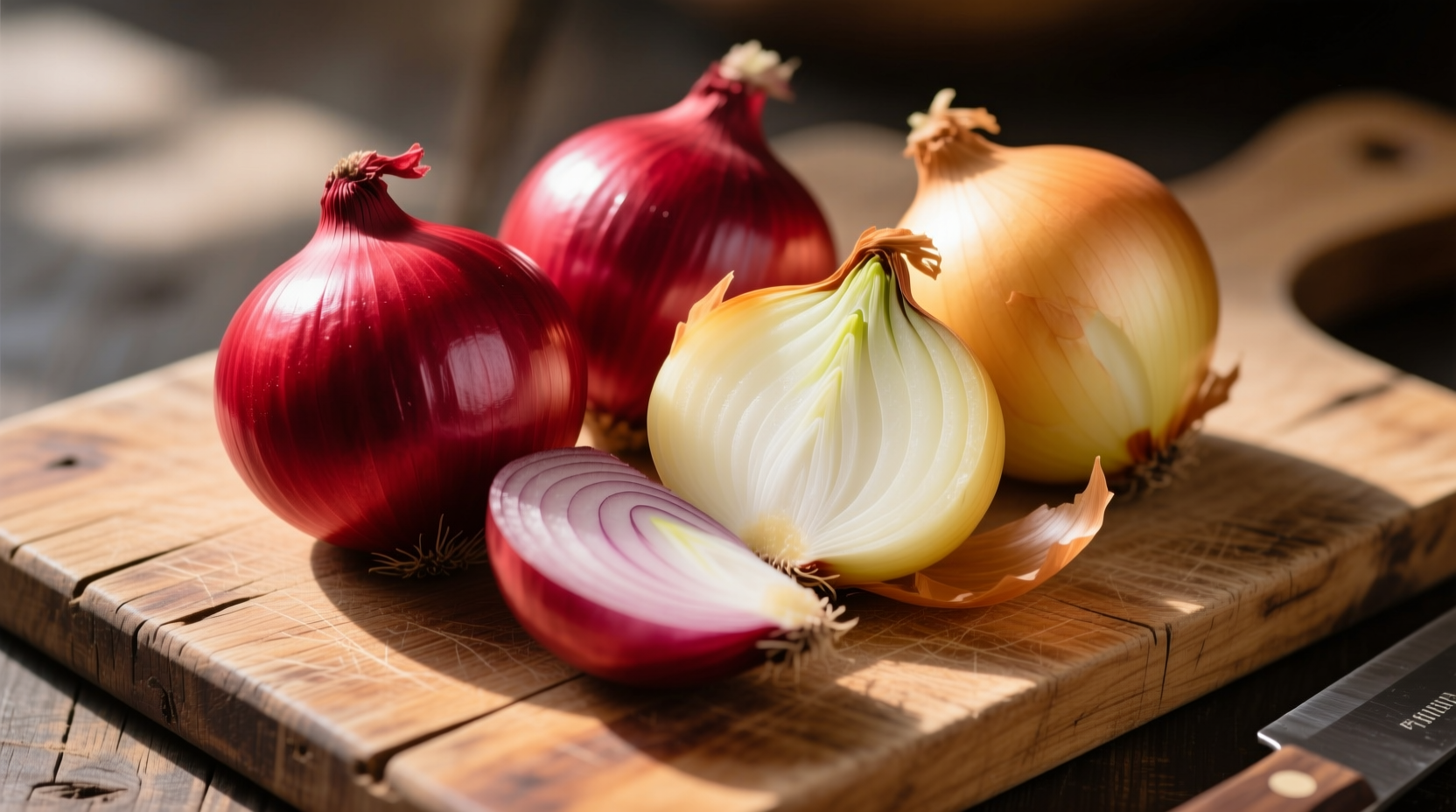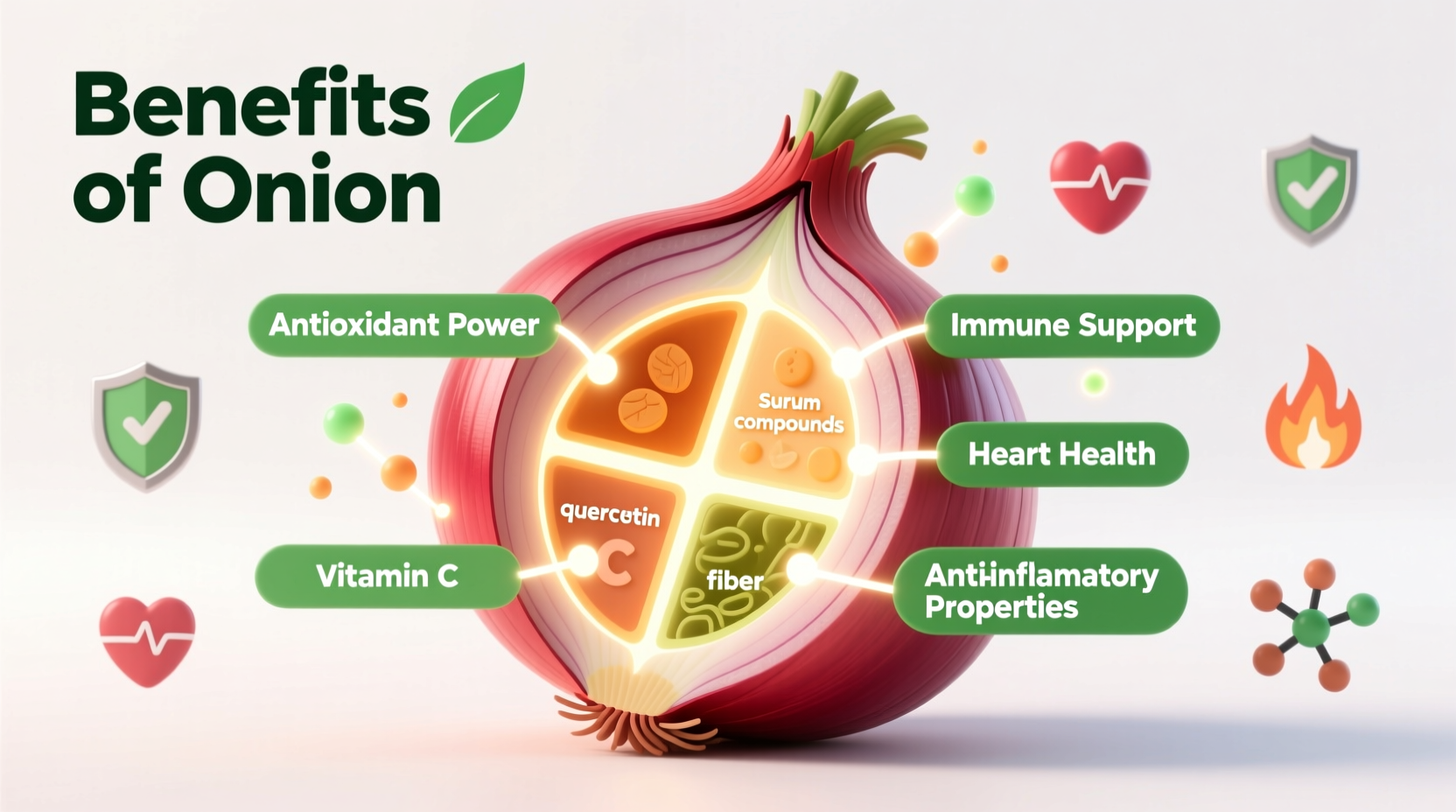Why Onion Benefits Matter for Your Daily Health
When you reach for onions in your kitchen, you're accessing one of nature's most potent medicinal foods. Research shows regular onion consumption correlates with measurable health improvements across multiple body systems. Unlike many 'superfood' claims, onion benefits are supported by decades of scientific research from institutions like the National Institutes of Health and peer-reviewed medical journals.
Science-Backed Health Benefits of Onions
Heart Health Protection Through Multiple Mechanisms
Onions contain organosulfur compounds that directly impact cardiovascular health. A 2022 study published in the American Journal of Clinical Nutrition demonstrated that regular onion consumption reduces systolic blood pressure by an average of 5-8 mmHg in hypertensive patients. The American Heart Association recognizes onions as part of heart-healthy dietary patterns due to their ability to:
- Reduce LDL ("bad") cholesterol oxidation
- Inhibit platelet clot formation
- Improve endothelial function in blood vessels
- Lower triglyceride levels
Powerful Anti-Inflammatory Effects
The quercetin in onions blocks inflammatory pathways at the cellular level. Research from the National Center for Biotechnology Information shows onion extract reduces C-reactive protein (CRP) levels by up to 35% in chronic inflammation cases. This makes onions particularly valuable for managing conditions like:
- Osteoarthritis pain and stiffness
- Asthma symptoms
- Chronic skin inflammation
- Post-exercise muscle soreness
Blood Sugar Regulation Support
Onions contain compounds that enhance insulin sensitivity. A clinical trial documented in Nutrition Research found that participants with type 2 diabetes who consumed 100g of red onions daily experienced 25% lower fasting blood glucose levels after four weeks. The chromium and sulfur compounds in onions work synergistically to improve glucose metabolism.
Antioxidant Powerhouse Profile
Onions rank among the top vegetable sources of dietary antioxidants. According to USDA data, red onions contain 11 times more antioxidants than white onions. The flavonoid quercetin, anthocyanins (in red varieties), and organosulfur compounds create a protective network against oxidative stress throughout the body.
| Onion Type | Key Antioxidants | Unique Health Benefits | Best Preparation Method |
|---|---|---|---|
| Red Onions | Anthocyanins, Quercetin | Cardiovascular protection, Cancer prevention | Raw in salads |
| Yellow Onions | Quercetin, Kaempferol | Blood sugar regulation, Anti-inflammatory | Sautéed or roasted |
| White Onions | Allicin, Organosulfur compounds | Digestive health, Immune support | Cooked in dishes |
| Green Onions | Vitamin K, Carotenoids | Bone health, Vision support | Raw as garnish |
Maximizing Onion Health Benefits Through Smart Preparation
How you prepare onions significantly impacts their nutritional value. Research from the Journal of Agricultural and Food Chemistry reveals these evidence-based preparation techniques:
Optimal Cutting and Resting Time
After cutting onions, wait 5-10 minutes before cooking. This allows the enzyme alliinase to convert precursors into beneficial organosulfur compounds. Immediate cooking destroys this enzymatic process, reducing health benefits by up to 50%.
Cooking Temperature Matters
Low to medium heat preserves more antioxidants than high-heat methods. A study comparing cooking methods found:
- Raw: Highest quercetin retention (100%)
- Steaming: 85% quercetin retention
- Sautéing: 70% quercetin retention
- Frying: Only 30% quercetin retention
Pairing for Enhanced Absorption
Combine onions with healthy fats like olive oil to increase absorption of fat-soluble antioxidants. The vitamin C in onions also enhances iron absorption from plant-based foods when eaten together.
Practical Ways to Incorporate More Onions Daily
You don't need dramatic dietary changes to benefit from onions. These simple strategies deliver consistent health advantages:
Breakfast Boosters
Add finely diced red onions to omelets or scrambled eggs. The vitamin C in onions remains stable during brief cooking and enhances iron absorption from eggs.
Lunchtime Solutions
Create a red onion and arugula salad with lemon vinaigrette. The acidity preserves quercetin while the raw preparation maximizes antioxidant content. Aim for 1/2 cup of raw red onions daily for optimal benefits.
Dinner Enhancements
Sauté yellow onions with garlic as the flavor base for soups, stews, and sauces. The low-temperature cooking preserves beneficial compounds while creating complex flavor profiles.

Important Considerations and Limitations
While onions offer significant health advantages, certain individuals should exercise caution:
Digestive Sensitivity
People with irritable bowel syndrome (IBS) may experience discomfort from onions' fructans. The Monash University Low FODMAP Diet guidelines recommend limiting onion intake to 1/4 cup cooked or 1 tablespoon raw for IBS management. Consider using the green tops of scallions as a lower-FODMAP alternative.
Medication Interactions
Onions' blood-thinning properties may interact with anticoagulant medications like warfarin. Consult your healthcare provider about consistent onion consumption if you take blood thinners. The National Institutes of Health advises maintaining stable intake rather than dramatic increases or decreases.
Research Limitations to Understand
Most onion research comes from observational studies and laboratory research. While human clinical trials show promising results, more large-scale human studies are needed to establish definitive cause-and-effect relationships for certain health claims. Current evidence strongly supports onions as part of a healthy dietary pattern rather than a standalone treatment.
Conclusion: Making Onions Work for Your Health
Onions represent one of the most accessible and scientifically supported functional foods available. By understanding which varieties offer specific benefits and how to prepare them for maximum nutritional impact, you can harness their health-promoting properties effectively. Incorporate a variety of onion types throughout your week to access their full spectrum of benefits while minimizing potential digestive issues.











 浙公网安备
33010002000092号
浙公网安备
33010002000092号 浙B2-20120091-4
浙B2-20120091-4